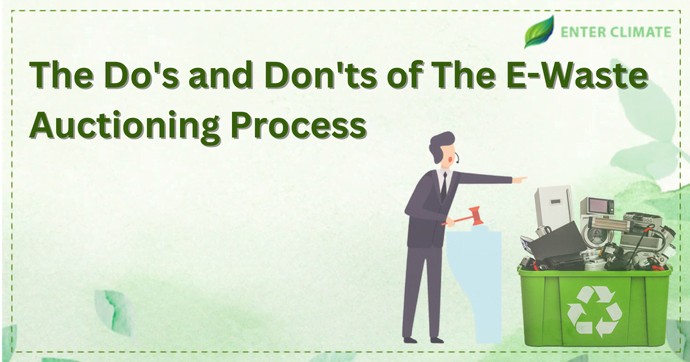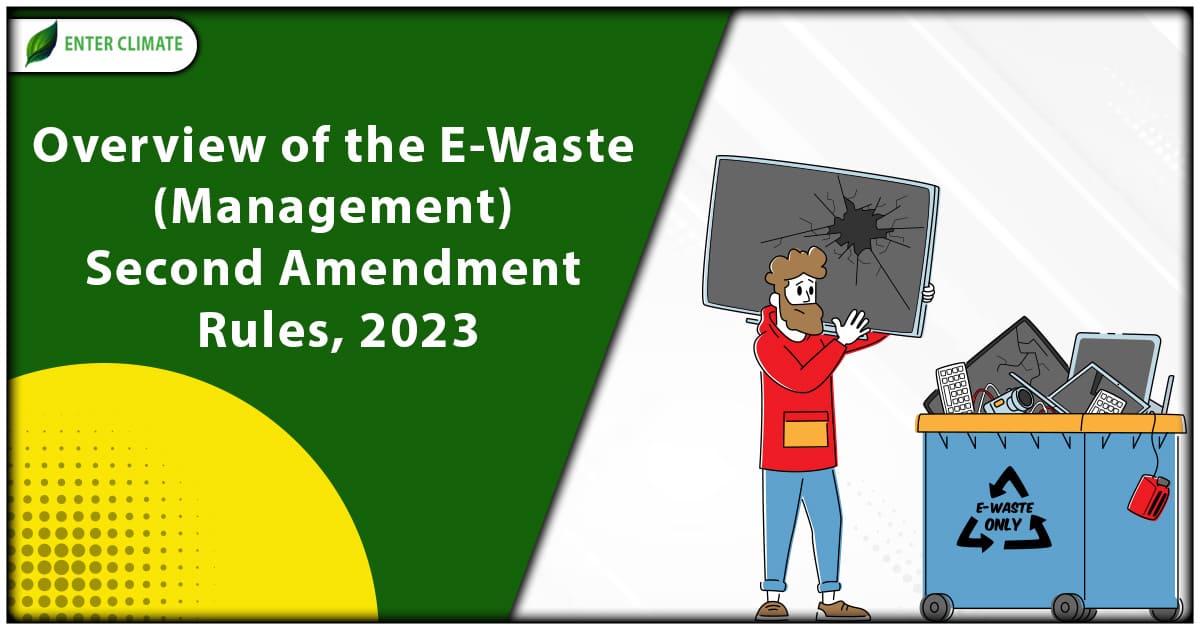The Do’s and Don’ts of the E-waste Auctioning Process
 16 Sep, 2022
16 Sep, 2022 
A person’s performance on the auction parameters can decide how good the process will be for him. Successful people in this business or enthusiastic entrepreneurs may need a simple yet effective do’s and don’ts list of the E-waste Auctioning Process for quick reference. This helps them to check all the boxes before getting ready to participate in the auction. So, read on to gain an overview of e-waste auctioning practices followed by public and private platforms conducting the process in India.
Let’s begin by briefly understanding the e-waste auctioning process concept.
E-waste auction: Definition and types
E-waste auctions are public sales in which the electronic waste is sold to the bidder who offers to pay the most. E-waste is any non-functional or old electrical or electronic equipment that the owner discards in both working and defunct conditions. An e-waste auctioning process is designed to get the best possible price for non-functional or Waste Electrical and Electronics Equipment (EEE). Many consumers carry it out in both the private and public sectors. Generally, the items on auction include- waste from offices, communication electronic and electrical devices used in homes, IT devices, medical equipment, lab equipment, etc.
Types of E-waste Auctions
Traditional E-waste Auctioning Process: It is a primarily practised type of auction. Many government bodies that want to dispose of their e-waste go for the traditional auction process. General conditions applicable in this type of auction are listed in the bidding document released when the auctions are announced. If governmental agencies announce the auction, the bidder has to register as per E-waste Management Rules with MoEF&CC/Central Pollution Control Board (CPCB) and the SPCB (State Pollution Control Board) /PCC (Pollution Control Committee) under the state. Updates related to the e-auction are given in the same format in which the tender announcement was made.
E-auction in E-waste Auctioning Process: In the case of the e-auction of e-waste, the portals carry out the process. The government or private entities manage such e-auction portals as per the auctioneer’s nature and requirement. E-waste that has to be auctioned is listed on the online platform along with its make and quantity. Pictures of electronic waste are also attached in many cases. Complete details of the registration and authorisation process required by the bidders to participate in the e-waste auctioning process are mentioned in the information document. However, bidders have to register at the online auction platform.
General stages of bidding during the E-waste auctioning process in India
The standard procedure of bidding is decided by the entity conducting the auction. The items for bidding usually follow an “As is where is basis” principle.
A bidder pays a small amount known as Earnest money Deposit (EMD) to be able to participate in the bidding of the e-waste auctioning process. It is a sum of money paid by the bidder to the seller/auctioneer to reflect that the bidder entering the auction is desirous of participating and does so in good faith.
For successful bids, the EMD is adjusted in the bid’s value, while the EMD of unsuccessful bidders is returned within one month of the auction date without any interest.
Usually, the State/Central PSUs[1], Government of India Societies, etc., are exempted from paying this fee. The fee is deposited as a Demand Draft (DD) and sent along with the bid document at the notified address. While the conduct of an e-waste auction is similar to any other auction, the opportunity to verify the items is given. All other elements remain the same as a physical auction.
Do’s of E-waste Auctioning Process
For traditional auctions
- The bidder participating in the e-waste auctioning process has to sign a declaration attached with the bid application along with details like the name, address and the EMD. In case of submitting a tender, each page needs to be signed by the bidder.
- Bidders must affirm that they are registered with the MoEF/CPCB/SPCB/PCC as an authorised recycler/re-processor and have management facilities that can collect, dispose, and recycle e-waste.
- If an item-wise bid needs to be submitted, it must be done on the bidder’s letterhead as per the format provided.
- The successful bidder must make a full balance payment within three days or as per the auction terms.
For Online E-waste auctions
- To establish authenticity during e-auctioning, the bidder may require a digital signature certificate from any certified licencing agency recognised by the Controller of Certifying Authorities (CCA), India.
- The interested bidders must mandatorily register on the e-portal of the auction management platform. Such registration generally requires the bidders to pay a registration fee.
- In the case of e-auctions, the auctioneer also provides the details to help bidders verify the items. These details must be kept in mind while submitting the bid.
- After the potential buyers are done reading the product for placing their bid, they have to get themselves registered within the stipulated timeframe.
Don’tsfor E-waste auctioning process
- The disposed-off items are not taken back by the auctioneer. So care must be taken to keep the bid value for the e-waste auctioning process reasonable, neither too high nor too low. However, the auctioneer can exercise its right to forfeit the entire amount or dispose of the items to an alternate bidder.
- E-waste tender is generally non-transferable. The bidders are not permitted to authorise any sub-contractor or other firm to collect the material or execute the contract on his behalf.
- The images of the e-waste to be auctioned found on the portal must be cross-checked physically when allowed to be inspected. Before the process starts, potential bidders or buyers are usually given some time to examine and check the product’s condition.
- Lastly, one shouldn’t forget to fill out the checklist affirming that all necessary documents and fees have been enclosed.
How can one participate in the E-waste auctioning process?
Entities that track the e-waste auctioning process and help units with their licencing and documentation needs must be approached. For instance, auctions conducted by Metal Scrap Trade Corporation need an MSTC licence which is a cumbersome process. This may also require the guidance of experts who aid in the business setup process. Getting all necessary authorisation and permits to conduct or participate in e-waste auctions lawfully is a must.
Conclusion
Recycling discarded electronic equipment is always profitable as e-waste has a lot of hidden value associated with it. To turn the e-waste auctioning process into an advantage, the bidder must offer the winning bid and be an experienced firm capable of performing environment-friendly recycling of electronic products. For such entities, a do’s and don’ts list comes in handy.
Read our Article:How to Set Up Refurbished Mobile E-waste Management Business
Categories
Latest Post
Air pollution Dispersion Modeling
Natural Disaster Risk Assessment
Endangered Species Protection
Aquifer Recharge Project
Sustainable Sanitation Solutions














